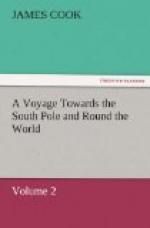At eight o’clock in the morning, on the third, the wind veered to S.W. and blew a strong gale by squalls, attended with rain. I now gave over all thought of returning to the land we had left. Indeed, when I considered the vast ocean we had to explore to the south; the state and condition of the ship, already in want of some necessary stores; that summer was approaching fast, and that any considerable accident might detain us in this sea another year; I did not think it advisable to attempt to regain the land.
Thus I was obliged, as it were by necessity, for the first time, to leave a coast I had discovered, before it was fully explored.—I called it New Caledonia; and, if we except New Zealand, it is perhaps the largest island in the South Pacific Ocean. For it extends from the latitude of 19 deg. 37’, to 22 deg. 30’, S., and from the longitude of 163 deg. 37’ to 167 deg. 14’ E. It lies nearly N.W. 1/2 W., and S.E. 1 E., and is about eighty-seven leagues long in that direction; but its breadth is not considerable, not any where exceeding ten leagues. It is a country full of hills and valleys; of various extent both for height and depth. To judge of the whole by the parts we were on, from these hills spring vast numbers of little rivulets, which greatly contribute to fertilize the plains, and to supply all the wants of the inhabitants. The summits of most of the hills seem to be barren; though some few are cloathed with wood; as are all the plains and valleys. By reason of these hills, many parts of the coast, when at a distance from it, appeared indented, or to have great inlets between the hills; but, when we came near the shore, we always found such places shut up with low land, and also observed low land to lie along the coast between the seashore and the foot of the hills. As this was the case in all such parts as we came near enough to see, it is reasonable to suppose that the whole coast is so. I am likewise of opinion, that the whole, or greatest part, is surrounded by reefs or shoals, which render the access to it very dangerous, but at the same time guard the coast from the violence of the wind and sea; make it abound with fish, secure an easy and safe navigation along it, for canoes, etc.; and, most likely, form some good harbours for shipping. Most, if not every part of the coast, is inhabited, the Isle of Pines not excepted; for we saw either smoke by day, or fires by night, wherever we came. In the extent which I have given to this island, is included the broken or unconnected lands to the N.W. That they may be connected; I shall not pretend to deny; we were, however, of opinion that they were isles, and that New Caledonia terminated more to S.E.; though this at most is but a well-founded conjecture.




